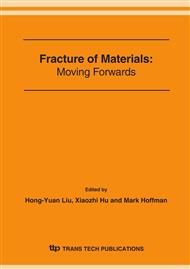p.205
p.211
p.217
p.223
p.229
p.233
p.237
p.243
p.251
Preparation of Nano-Silica/Polypropylene Composites Using Reactive Compatibilization
Abstract:
Nano-sized silica particles were pre-grafted with poly(glycidyl methacrylate) (PGMA) by solution free-radical polymerization. When these grafted silica nanoparticles were melt compounded with polypropylene (PP), reactive compatibilization effect was perceived due to the chemical bonding between the grafted PGMA and amine functionalized PP, which led to a significant increase of tensile strength and notch impact strength of PP at rather low filler content. Accordingly, compatibility of each kind of the functionalized PP with grafted SiO2 nanoparticles was evaluated through investigating the mechanical properties, crystallization behavior and rheological performance of the composites. The results show that the reactive compatibilization is capable of providing stronger interfacial adhesion.
Info:
Periodical:
Pages:
229-232
DOI:
Citation:
Online since:
June 2006
Authors:
Price:
Сopyright:
© 2006 Trans Tech Publications Ltd. All Rights Reserved
Share:
Citation:


